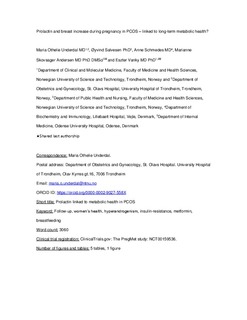| dc.contributor.author | Underdal, Maria Othelie | |
| dc.contributor.author | Stridsklev, Solhild | |
| dc.contributor.author | Oppen, Ingrid Hennum | |
| dc.contributor.author | Høgetveit, Kristin | |
| dc.contributor.author | Andersen, Marianne Skovsager | |
| dc.contributor.author | Vanky, Eszter | |
| dc.date.accessioned | 2019-06-14T07:08:24Z | |
| dc.date.available | 2019-06-14T07:08:24Z | |
| dc.date.created | 2018-07-31T14:59:43Z | |
| dc.date.issued | 2018 | |
| dc.identifier.citation | Journal of Clinical Endocrinology and Metabolism. 2018, 103 (6), 2408-2413. | nb_NO |
| dc.identifier.issn | 0021-972X | |
| dc.identifier.uri | http://hdl.handle.net/11250/2600793 | |
| dc.description.abstract | Context
Worldwide, metformin is prescribed to improve pregnancy outcome in polycystic ovary syndrome (PCOS). Metformin may also benefit future health by modulating increased metabolic stress during pregnancy.
Objective
To investigate whether metformin during pregnancy modified future metabolic health in women with PCOS.
Design
Follow-up study of a randomized controlled trial that compared metformin with placebo in women with PCOS. Mean follow-up period was 7.7 years (range, 5 to 11 years).
Setting
Three university hospitals, seven local hospitals, and one gynecological specialist practice.
Participants
Women with PCOS according to Rotterdam criteria; all former participants in the Metformin in Pregnant PCOS Women Study.
Intervention
Metformin 2000 mg daily or placebo from first trimester to delivery in the original study. No intervention in the present follow-up study.
Main Outcomes and Measures
Main outcome measure was weight gain in the follow-up period. Weight, body mass index (BMI), waist and hip circumferences, and blood pressure (BP) were registered. Body composition was assessed by bioelectrical impedance analysis, and fasting lipids, glucose, and insulin were analyzed.
Results
Of 239 invited women, 131 (55%) participated in the follow-up. Weight gain was similar in women given metformin (2.1 ± 10.5 kg) and women given placebo (1.8 ± 11.2 kg) at 7.7 years’ follow-up after pregnancy (P = 0.834). No difference was found in BMI, waist/hip ratio, BP, body composition, lipids, glucose and insulin levels, or prevalence of metabolic syndrome at follow-up between those treated with metformin and those treated with placebo during pregnancy.
Conclusion
Metformin treatment during pregnancy did not influence the metabolic profile in women with PCOS at 7.7 years of follow-up. | nb_NO |
| dc.language.iso | eng | nb_NO |
| dc.publisher | Oxford University Press | nb_NO |
| dc.title | Does Metformin Treatment during Pregnancy Modify the Future Metabolic Profile in Women with PCOS? | nb_NO |
| dc.type | Journal article | nb_NO |
| dc.type | Peer reviewed | nb_NO |
| dc.description.version | acceptedVersion | nb_NO |
| dc.source.pagenumber | 2408-2413 | nb_NO |
| dc.source.volume | 103 | nb_NO |
| dc.source.journal | Journal of Clinical Endocrinology and Metabolism | nb_NO |
| dc.source.issue | 6 | nb_NO |
| dc.identifier.doi | 10.1210/jc.2018-00485 | |
| dc.identifier.cristin | 1599215 | |
| dc.description.localcode | This is a pre-copyedited, author-produced version of an article accepted for publication in Journal of Clinical Endocrinology & Metabolism following peer review. The version of record is available online at: https://academic.oup.com/jcem/article/103/6/2408/4961064 and https://doi.org/10.1210/jc.2018-00485 | nb_NO |
| cristin.unitcode | 194,65,15,0 | |
| cristin.unitcode | 1920,13,0,0 | |
| cristin.unitcode | 194,65,0,0 | |
| cristin.unitname | Institutt for klinisk og molekylær medisin | |
| cristin.unitname | Kvinneklinikken | |
| cristin.unitname | Fakultet for medisin og helsevitenskap | |
| cristin.ispublished | true | |
| cristin.fulltext | postprint | |
| cristin.qualitycode | 2 | |
